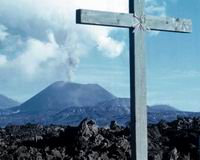
Why Observe Easter?
Easter Sunday is the most important memorial day in the faith of the Christian. Easter is more important than Christmas, for it is the crowning work of Jesus, the Messiah. Apart from Easter, the story of Jesus would be the story of a good man who died. There would be no basis for understanding Him in any other terins than as a simple, misguided, misdirected, good man.
What does the resurrection mean for the modern Christian? Sometimes the resurrection is compared to the sense in which Abraham Lincoln lives on in the hearts of man. But such a comparison is far beneath what true Christians believe concerning Christ and His resurrection. If only the spirit of Jesus lives on, apart from a bodily resurrection, then there is no such thing as a resurrection; and the spirit that lives on is not a living and powerfull spirit associated with the nature of God. It amounts to nothing more than sentimentality.
On the other hand, Christians in the early New Testament period were aware that they had seen, felt, touched, and eaten with a person who had been taken from the cross dead, and who now was radiantly alive again in body. Whatever kind of body Jesus had in resurrected form, it certainly resembled the body that went into the tomb - it bore the marks of the cross and the scar of the sword on the side -- yet it had power beyond the pre-death state. Paul speaks of it as a "spiritual" body (1 Corinthians 15;44). This does not mean that it lacked identification with his pre-death body. This it must have had for the disciples to have recognized Jesus
The resurrection of Jesus Christ implies a work comparable to that in creation. The idea of such resurrection goes against the whole grain of experience. The story of mankind is death without a knowledge of anything beyond. But the resurrection means that not only is death the story of man but there is a life and existence beyond death. The power of God displayed here can only be compared to a new act of creation. God has turned back death. Death, in man's knowledge, now becomes only an intermission in his total existence.
The resurrection also means that righteousness has won out over evil. Before Jesus died he declared, "It is finished." Redemption was then complete and the ultimate defeat of demonic forces was already evident. Although we still live within the conflict of good against evil, we live with the faith of the poet that "although truth is forever on the scaffold and wrong forever on the throne; yet that scaffold sways the future and behind the dim unknown stands God within the shadows, keeping watch above His own." We are now engaged in the clean-up battle and though there are encounters that are lost, sure, ultimate victory is in the hands of our crucified, risen, coming again Lord.
The resurrection means something more than just an event of long ago.The New Testament is emphatic in stating that by faith in Christ the believer is crucified and raised with Him. To appreciate these words, one must understand that the human race is viewed from the standpoint of two men: Adam and Christ. To these two men all other men are attached as though to the hems of their garments. When Adam died, all men died. By faith one can place himself within the life of Christ, being raised with Him from the dead (Colossians 2:12). If the believer is raised with Christ then certain things follow. First, our lives are hidden in Christ (3:3) and the source of this life cannot be touched because it rests in God's own nature. Nothing can harm His life; therefore, nothing can destroy our lives. Second, by being raised in Christ's resurrection the fullest expression of our lives is ahead. Christ, our life, will come and we will also appear with Him in glory. Thus our lives today are contemporary with Christ's resurrection power.
Without the testimony of the empty tomb as the turning point of history, the future of man lacks a point of fulfiIlment. But the empty tomb pronounces a divine No against the tyranny of history and the relativities of life. And the empty tomb pronounces a divine Yes for godliness, wholesomeness, purity in mind and morals, and purpose in life. The resurrection of Jesus Christ is the one delightful turning point in history that gives meaning where no other real meaning can be found.
(This article appeared in the April 10, 1966 issue of Today.)